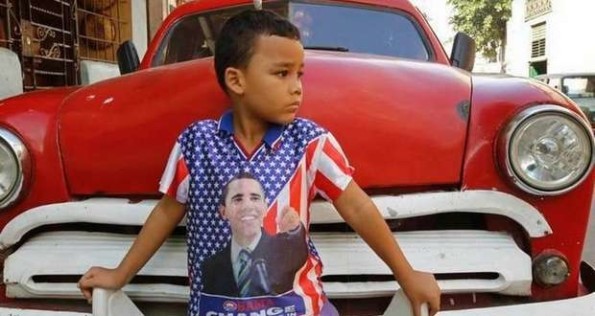Ivan Garcia, 14 April 2015 — While a marathon of presidential speeches takes place at Panama City’s Atlapa convention center, back in Cuba the real civil society — the one about which many talk but to which few listen — is biting its nails in front of the television, watching the Cuban baseball playoffs between the Tigers from Ciego de Avila and the Pirates from Isla de la Juventud.
Yordan, a steel worker from the outskirts of Havana, was one of them. It was while sitting down to play dominoes and drink rum with neighborhood friends one night that he learned about the meeting between Obama and Castro.
Suddenly in the role of armchair analysts, they speculated a bit about what a future partnership with the U.S. might hold.
“Listen, in spite of fifty-five years of being bombarded by negative press about the Yankees, most Cubans who decide to emigrate choose to go to the Yuma*. In Cuba everyone goes wild for American brands. Those old, worn-out theories and that stuff about annexation have nothing to do with what you see. Relatives and friends come back fatter and better dressed. They take you out for a beer, they show you photos of their cars and later they send you a tablet or smart phone. That is more powerful than any propaganda,” says Yordan, ebullient after downing half a liter of cheap rum.
Havana residents interviewed for this article all had an opinion on this topic. Sergio, a retired soldier, wonders if the decades-long rhetoric against the United States was worth it.
“I fought in the Angola civil war. Like others, I did it in the name of international proletarianism. At the time I thought Yankee imperialism would be ancient history by decade’s end. It’s been twenty-six years since I came back from Angola and the reality is quite different. If we don’t negotiate with the old enemy, the Cuban revolution won’t be sustainable. I feel sorry for the more than two thousand soldiers who lost their lives in someone else’s war,” says the former soldier.
Among the wide range of opinions held by average Cubans, there are enthusiastic optimists like Raudel, a young university student. “Now we will really build socialism. It will be by the shortest route, which is through capitalism. When we have three million tourists, fast food restaurants and broadband internet, come back and ask if people still believe in Fidel Castro and his boring anti-imperialist rallies,” he says in a jocular tone, sitting in a park and listening to Joaquin Sabina on a MP3 player.
It is not easy to find “Talibans” (extremists) who believe “negotiating with the enemy is a strategic mistake.” The vast majority of Cubans enthusiastically approve of the new agreement.
But there are also people such as Moises, a hard-core follower of Fidel Castro, who have their doubts. “I worry that Raul suffers from naiveté. Obama can be very charming and a large segment of the population is seduced by the American lifestyle. If we spread our legs too wide, Havana could end up being a suburb of Miami.”
Since the Obama-Castro policy change was announced on December 17, there has been a good vibe in Cuba. “Besides being our neighbor, the United States has always been a reference point for music, movies, sports and lifestyle,” notes Manuel, a historian.
“Twenty percent of the population lives in Florida. Miami is the country’s second city. Only Havana has a larger Cuban population. Russian cuisine and Venezuelan arepa never caught on here. But if you opened a McDonald’s or a Cafe Versailles, the line to get in would go on for miles. Our national heroes were dazzled by the American revolution. Despite our grievances and the Platt Amendment, Cubans admire the United States, which is not the case with some other Latin American countries.”
There are no television ratings in Cuba for the Summit of the Americas, but the only coverage for which people did not change the channel were the speeches by Obama and Raul Castro.
The Summit of the People and the tiresome rhetoric of Nicolas Maduro attracted little attention. The official narrative — accusing dissidents of being mercenaries and terrorists — was a distant echo.
“At the rate things are going, don’t be surprised if within five years the government feels like talking to the human rights people (as dissidents are referred to in Cuba). If we can talk to the Yankees, why not talk to them?” asks Eugenio, a self-employed taxi driver.
In spite of sudden shifts in optimism and suspicion after the December 17 announcement, it is clear that Obama is more popular in Cuba than in the United States. And his popularity far exceeds that of Raul Castro according to a recent survey.
This comes as no surprise. Since an African-American won the U.S. presidential elections in 2008, Afro-Cubans have felt some empathy for Obama. Even the Castros have thrown themselves at his feet.
Initially, Fidel tried to seduce him but, after being rebuffed by Obama, he once again took up the sword. And shedding a few tears was the only thing Raul failed to do in a speech at the summit in which he expressed his admiration for the current resident of the White House.
“I would not complain if the Americans wanted to trade Obama for Raul Castro. Or we could give them Fidel and Miguel Diaz-Canal. We’ll consider any offers,” says a young man who is listening to a rock performance at the park on G Street in Vedado.
If anyone’s popularity in Cuba has been bolstered, especially after the Summit of the Americas, it is Barack Obama.
*Translator’s note: Cuban slang for the U.S.

